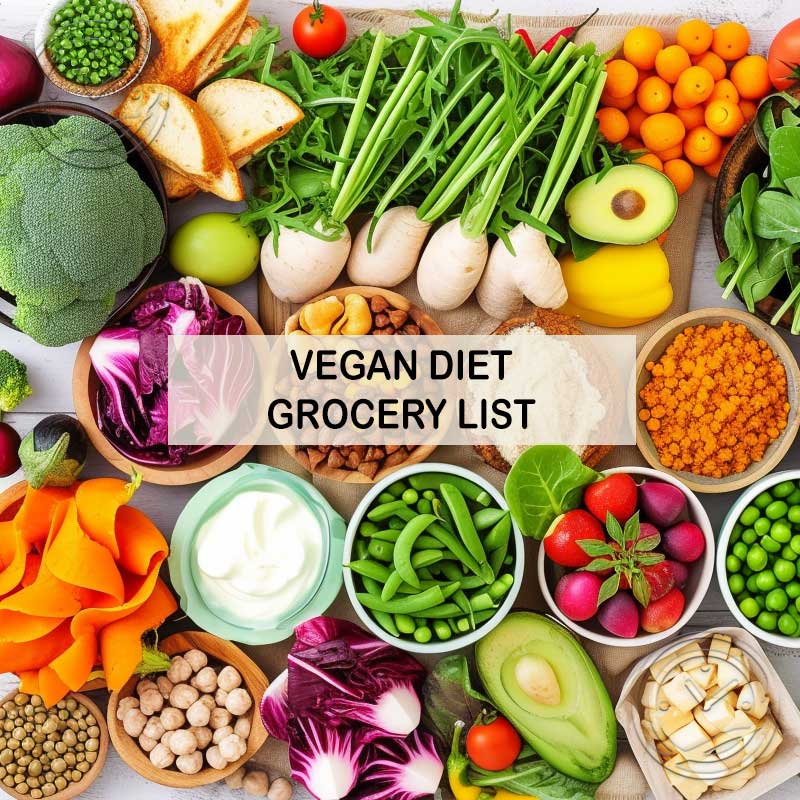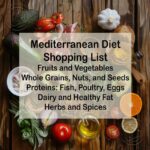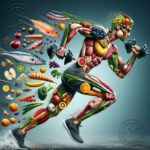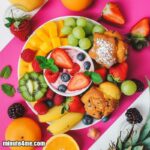Introduction to Vegan Grocery Shopping
Embarking on a vegan lifestyle is not just about removing animal products from your diet; it’s about embracing a wholesome and varied diet that nourishes your body.
The key to successful vegan grocery shopping lies in focusing on nutritional balance and ensuring a wide array of choices.
As a vegan shopper, you’re not only making a decision for your health but also contributing to environmental sustainability.
You’ll discover a new world of flavors, textures, and nutrients in plant-based foods, from the crunch of fresh vegetables to the creaminess of dairy alternatives.
Here’s how to navigate through the grocery aisles:
- Variety: Aim for a colorful range of fruits and vegetables.
- Balance: Ensure a good mix of proteins, carbohydrates, and healthy fats.
- Exploration: Be open to trying new foods like tempeh or different grains like quinoa.
- Reading Labels: Become adept at checking for non-vegan ingredients.
- Planning: Have a meal plan to make shopping more efficient and avoid food waste.
Vegan Diet Grocery List Essentials
Creating a comprehensive vegan grocery list is the first step to ensuring you have all the necessary ingredients for a nutritious diet.
Here’s a detailed breakdown:
Whole Grains:
- Oats: Perfect for breakfasts, from porridge to overnight oats.
- Brown Rice: A versatile base for stir-fries and bowls.
- Quinoa: A protein-packed grain, ideal for salads and sides.
Legumes:
- Lentils: Quick-cooking and great in soups or salads.
- Beans: Black beans, kidney beans, and more for hearty meals.
Nuts and Seeds:
- Almonds, Cashews, Walnuts: Nutrient-dense snacks or salad toppers.
- Chia Seeds, Hemp Seeds: Superfoods for smoothies or as a yogurt topping.
Nutrient-Rich Foods for Hair Growth
Unlock the secret to luscious locks and vibrant hair health with the power of nutrient-rich foods. Your hair's vitality and…
Must-Have Fruits and Vegetables
Fruits and vegetables are the cornerstone of a vegan diet, offering an abundance of vitamins, minerals, and fiber.
Here’s a guide to some must-have produce:
| Fruits | Benefits |
|---|---|
| Berries | High in antioxidants and vitamins. |
| Apples | Great for fiber, aiding in digestion. |
| Oranges | Vitamin C powerhouse. |
| Bananas | Potassium-rich for heart health. |
| Avocados | Loaded with healthy fats and vitamin E. |
| Vegetables | Benefits |
|---|---|
| Leafy Greens (kale, spinach) | Iron and calcium sources. |
| Broccoli, Cauliflower | Rich in vitamins K and C. |
| Carrots, Sweet Potatoes | High in beta-carotene, good for skin and eye health. |
| Onions, Garlic | Adds flavor and has anti-inflammatory properties. |
Protein Sources
Proteins are fundamental in a vegan diet for muscle repair and overall health.
Here are some key sources:
| Protein Source | Benefits |
|---|---|
| Tofu, Tempeh | Complete proteins, adaptable in various recipes. |
| Lentils, Beans, Chickpeas | Heart-healthy and high in fiber. |
| Nutritional Yeast | Adds a cheese-like flavor and is a vitamin B12 source. |
| Edamame | Snack-friendly and rich in protein. |
These can be creatively incorporated into meals, ensuring you get your daily protein needs in a delicious way.
Mediterranean Diet Shopping List
Explore the Mediterranean Shopping List and embark on a culinary journey that not only tantalizes your taste buds but also…
Dairy Alternatives and Plant-Based Milks
The world of dairy alternatives has expanded, offering delicious and nutritious options.
Here’s a look at some popular choices:
Plant-Based Milks:
- Soy Milk: Closest to cow’s milk in protein content.
- Almond Milk: Low in calories, great for cereals and smoothies.
- Oat Milk: Creamy texture, ideal for coffee and baking.
Other Dairy Alternatives:
- Vegan Yogurt: Made from coconut, almond, or soy; great for gut health.
- Cheese Alternatives: Various options based on nuts and soy for your cheese fix.
These alternatives not only cater to vegans but also to those with lactose intolerance, providing a range of options for different dietary needs and preferences.
Planning Nutritious Vegan Meals
Planning nutritious vegan meals is both an art and a science.
It’s about balancing flavors and nutrients to create meals that are as satisfying as they are healthy.
When planning your vegan meals, consider:
- Macronutrient Balance: Ensure each meal has a good balance of proteins, fats, and carbohydrates.
- Colorful Vegetables: The more colorful your plate, the broader the range of vitamins and minerals.
- Whole Foods: Focus on whole grains, legumes, nuts, seeds, and fresh produce.
- Meal Prepping: Cook in batches to save time and ensure you always have healthy options on hand.
- Creative Substitutes: Use ingredients like lentils or chickpeas to replace meat in traditional recipes.
Mediterranean Diet Shopping List
Explore the Mediterranean Shopping List and embark on a culinary journey that not only tantalizes your taste buds but also…
Cooking and Baking Staples
For those who love to cook and bake, having the right vegan staples in your pantry is crucial.
Here’s a list to get you started:
| Staples | Uses |
|---|---|
| Whole Wheat & Spelt Flour | For healthier baking options. |
| Baking Powder & Soda | Essential for vegan baking. |
| Coconut & Brown Sugar | Natural sweetening alternatives. |
| Olive & Avocado Oil | Healthy fats for cooking and dressings. |
| Spices (Cinnamon, Nutmeg, Ginger) | To add flavor and depth to dishes. |
Budget-Friendly Shopping Tips
Eating vegan doesn’t have to be expensive.
Here are some tips for staying on budget:
- Buy in Bulk: Grains, legumes, nuts, and seeds are often cheaper in bulk.
- Seasonal Produce: Opt for fruits and vegetables that are in season for better prices and flavors.
- Grow Your Own: Consider growing herbs and simple vegetables like tomatoes or peppers.
- Generic Brands: Many stores offer cheaper, generic versions of vegan staples.
- Plan and Prep: Reduce waste by planning meals and using leftovers creatively.
Snacks and Desserts
Snacks and desserts are an important part of any diet, vegan included.
Here are some delicious and healthy options:
- Fruits and Vegetables: Always a quick and nutritious choice.
- Nuts and Seeds: Perfect for a crunchy snack.
- Dark Chocolate: Look for high cocoa content for a healthier treat.
- Energy Balls: Make your own with dates, nuts, and seeds.
- Vegan Baked Goods: Experiment with dairy-free and egg-free baking.
Drinks and Beverages
Staying hydrated and enjoying various beverages is easy on a vegan diet:
- Water: Always the best choice for hydration.
- Plant-Based Milks: Great for smoothies or as a dairy alternative in coffee.
- Herbal Teas: A wide range of flavors for every mood and time of day.
- Fresh Juices: Make your own for a vitamin-packed drink.
- Vegan Smoothies: Combine fruits, greens, and plant-based milk for a nutritious treat.
Personalizing Your Vegan Grocery List
Tailoring your vegan grocery list to your personal needs and preferences is important:
- Dietary Restrictions: Gluten-free, soy-free, or nut-free options are available.
- Cultural Cuisine: Incorporate familiar flavors and ingredients from your cultural background.
- Fitness Goals: Adjust protein and carb intake based on your fitness routine.
- Family Preferences: Consider the likes and dislikes of everyone in your household.
Conclusion
Embracing a vegan lifestyle is about exploring a world of diverse, nutritious, and delicious foods while also contributing to environmental sustainability.
Remember, being vegan goes beyond what’s on your plate; it’s a commitment to a healthier, more ethical, and sustainable lifestyle.
Enjoy the journey of discovering new foods, flavors, and the many benefits of a plant-based diet.





